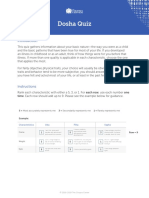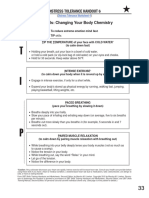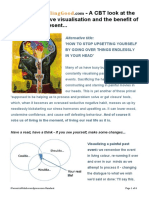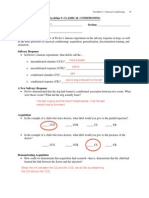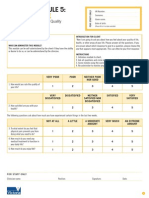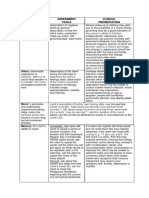39 MysteryTherapist
39 MysteryTherapist
Uploaded by
passionponyCopyright:
Available Formats
39 MysteryTherapist
39 MysteryTherapist
Uploaded by
passionponyOriginal Description:
Original Title
Copyright
Available Formats
Share this document
Did you find this document useful?
Is this content inappropriate?
Copyright:
Available Formats
39 MysteryTherapist
39 MysteryTherapist
Uploaded by
passionponyCopyright:
Available Formats
PsychSim 5: Mystery Therapist
65
PsychSim 5: MYSTERY THERAPIST
Mizani Washburn Name: __________________________________________
Section: ________________________
Date: __________________________________________ This activity will test your knowledge of the various types of psychotherapy. The Specific Types of Therapies Complete the table below by filling in one main point about each of the eight types of therapy and listing the case number and name of the client receiving that type of treatment. Case Number and Client
Case 7: Heather
Type of Therapy
Brief Description
a form of psychotherapy that attempts to give clients insight into their repressed or unconscious impulses, anxieties, and internal conicts stemming from early childhood; developed by Sigmund Freud a type of humanistic therapy in which the therapist reects the clients feeling, and fosters personal growth and self-awareness offers genuineness, acceptance, and empathy; also called person
a type of behavioral therapy in which a state of relaxation is classically conditioned to a hierarchy of gradually increasing anxiety- provoking stimuli
Psychoanalysis
Client-centered therapy
Case 3: Daniel
Systematic desensitization
Case 4: Jenna
Aversive conditioning
a type of behavioral therapy that attempts to reduce the frequency of a problem behavior by associating it with an unpleasant experience
a type of cognitive therapy that helps people discover and change their habitually negative patterns of thinking; developed by Aaron Beck
Case 1: James
Cognitive therapy for depression
Case 8: Rebecca
Family therapy
a form of psychotherapy that treats the family as a unit, focusing on relationships and problems among the various members of the family
Case 6: Rosa
Drug therapy
a biomedical therapy focused on prescribing medications that alter mental functions to alleviate psychological symptoms
Case 2: Shelia
Electroconvulsive therapy
a biomedical therapy used primarily in the treatment of depression; involves electrically inducing a brief brain seizure; also called shock therapy or electric shock therapy
Case 5: Randall
Commonalities of Effective Therapies As you tried to identify the various types of therapies represented in this activity, did you notice any common themes that ran through all of the therapies?
Despite their differences, all effective therapies offer at least three benets: (1) They all offer hope. The patient expects that things can and will get better. (2) Every therapy offers a fresh perspective, by providing a plausible explanation of clients symptoms, and an alternative way of looking at themselves and responding to their worlds. (3) Regardless of their therapeutic technique, all effective therapists provide an empathic, caring, and trustworthy relationship.
You might also like
- A Practical Guide To Mindfulness-Based Compassionate Living Living With Heart (Etc.) (Z-Library)Document181 pagesA Practical Guide To Mindfulness-Based Compassionate Living Living With Heart (Etc.) (Z-Library)lefariasantosNo ratings yet
- Stanislav Grof - Psychology of The FutureDocument1 pageStanislav Grof - Psychology of The Futureshtoetoxic100% (1)
- PSY 408 - Unit Exam #1 With Answers (7-3-2023)Document4 pagesPSY 408 - Unit Exam #1 With Answers (7-3-2023)Ashley TaylorNo ratings yet
- WorkbookDocument4 pagesWorkbookYoseph Ayele0% (1)
- Dosha Quiz 2019 PDFDocument8 pagesDosha Quiz 2019 PDFJose M AlayetoNo ratings yet
- Clinical Protocol For Spiritual PsychotherapyDocument12 pagesClinical Protocol For Spiritual PsychotherapyDanielMartinDomingue100% (1)
- 2 - Grazebrook, K & Garland, A. (2005) - What Are Cognitive and - Orbehavioural Psychotherapies - Paper Prepared For UKCP - BACP PDFDocument5 pages2 - Grazebrook, K & Garland, A. (2005) - What Are Cognitive and - Orbehavioural Psychotherapies - Paper Prepared For UKCP - BACP PDFAnastasiya PlohihNo ratings yet
- 24 Forgetting StuffDocument1 page24 Forgetting StuffpassionponyNo ratings yet
- Ocean Tides SeDocument3 pagesOcean Tides Sepassionpony50% (2)
- The Following Are Examples of A Couple of Communication Style ModelsDocument2 pagesThe Following Are Examples of A Couple of Communication Style ModelsyaenyNo ratings yet
- HTP Post Interrogation FormDocument3 pagesHTP Post Interrogation FormNica Mangampat100% (1)
- Identity in Coaching Worksheets: The Expensive PerfumeDocument4 pagesIdentity in Coaching Worksheets: The Expensive PerfumePoliteNo ratings yet
- Model HallucinationsDocument7 pagesModel HallucinationsDavid CrellinNo ratings yet
- Mindfulness Group ExerciseDocument12 pagesMindfulness Group ExerciseKimberly-Michael RossNo ratings yet
- How To Deal With Values Conflicts' - by Russ HarrisDocument9 pagesHow To Deal With Values Conflicts' - by Russ HarrisMaria Salve Obar BobisNo ratings yet
- A Narrative Therapy Workbook for Navigating Major Life TransitionsDocument35 pagesA Narrative Therapy Workbook for Navigating Major Life Transitionsvvn.sabryNo ratings yet
- Dokumen - Pub - 12 Essential Insights For Emotional Sobriety Getting Your Recovery Unstuck 12 Series 9781955415125 1955415129Document284 pagesDokumen - Pub - 12 Essential Insights For Emotional Sobriety Getting Your Recovery Unstuck 12 Series 9781955415125 1955415129kruithof100% (1)
- SE Protocols Yr 1 - Dec 2020, June 2021Document9 pagesSE Protocols Yr 1 - Dec 2020, June 2021kangourasNo ratings yet
- The Wounded Healer Talmud StoryDocument1 pageThe Wounded Healer Talmud Storytaeye0nNo ratings yet
- CBT For CFS Therapist ManualDocument54 pagesCBT For CFS Therapist ManualAS3No ratings yet
- Valley Hope - The 12 Steps of TransformationDocument33 pagesValley Hope - The 12 Steps of Transformationgpaul44No ratings yet
- Parent AngerDocument49 pagesParent AngerDivine EdehNo ratings yet
- Connecting With Your HeartDocument2 pagesConnecting With Your HeartAura OpreaNo ratings yet
- Cultivating Compassion - Key Components of Cognitively Based Compassion Training - Brooke Dudson - Lavelle & Tim HarrisonDocument13 pagesCultivating Compassion - Key Components of Cognitively Based Compassion Training - Brooke Dudson - Lavelle & Tim Harrisonccareemail100% (1)
- The Highly Sensitive Person Who Is Also A High Sensation Seeker – The Highly Sensitive PersonDocument6 pagesThe Highly Sensitive Person Who Is Also A High Sensation Seeker – The Highly Sensitive PersonBenedict PangNo ratings yet
- Week 2 - TPP WorkbookDocument10 pagesWeek 2 - TPP WorkbookDanut IstrateNo ratings yet
- Top Top Top TopDocument13 pagesTop Top Top Topapi-27619945No ratings yet
- Prefata Andrew FretwellDocument2 pagesPrefata Andrew FretwellLiliNo ratings yet
- Emotional Healing E-BookDocument13 pagesEmotional Healing E-Booklisa marieNo ratings yet
- Making Change in Our LivesDocument377 pagesMaking Change in Our LivesshylopereiraNo ratings yet
- Counselling Approaches To Psychological Disorders - Humanistic Approach - Client Centered Therapy, Existential Therapy, Gestalt TherapyDocument17 pagesCounselling Approaches To Psychological Disorders - Humanistic Approach - Client Centered Therapy, Existential Therapy, Gestalt Therapyjoshita.guptaNo ratings yet
- Challenging Beliefs WorksheetsDocument2 pagesChallenging Beliefs WorksheetsKhushi BukhrediaNo ratings yet
- Shadow Work JournalDocument25 pagesShadow Work Journaldota.isabelaNo ratings yet
- Case Formulation or Case ManagementDocument6 pagesCase Formulation or Case Managementasayesha kasanaNo ratings yet
- Script For Urge Surfing PDFDocument3 pagesScript For Urge Surfing PDFCarlos ReyesNo ratings yet
- Anger ManagementDocument2 pagesAnger Managementazizah mohdradzi100% (1)
- 2 VERSION Expository Essay - DonadioDocument2 pages2 VERSION Expository Essay - DonadioIara DonadíoNo ratings yet
- Gilbert 2010 HandoutDocument82 pagesGilbert 2010 HandoutbergsgetNo ratings yet
- Life Coaching: Cetificate CourseDocument8 pagesLife Coaching: Cetificate CourseMina Samir DiefNo ratings yet
- EFT Ends A Strong Addiction To Smoking CigarettesDocument3 pagesEFT Ends A Strong Addiction To Smoking CigarettesAzwar AzizNo ratings yet
- Introduction To Secure AttachmentDocument3 pagesIntroduction To Secure AttachmentDea DeaNo ratings yet
- Certification Course: MechanismsDocument8 pagesCertification Course: MechanismsEddy PopescuNo ratings yet
- Anger Management Intro and ObjectivesDocument3 pagesAnger Management Intro and ObjectivesAllyson DraytonNo ratings yet
- C M, B, S I T, B, S H P: Original ResearchDocument6 pagesC M, B, S I T, B, S H P: Original ResearchdjsalmanNo ratings yet
- The 4 Foundations of MindfulnessDocument3 pagesThe 4 Foundations of MindfulnessChris Lagiard-jones100% (1)
- W.miller on+Second+ThoughtDocument44 pagesW.miller on+Second+ThoughtMabe MusicNo ratings yet
- 5 Types of Dysfunctional Family DynamicsDocument2 pages5 Types of Dysfunctional Family DynamicsКрістіна ГолдинськаNo ratings yet
- What Happened To You ConversationDocument65 pagesWhat Happened To You ConversationmelNo ratings yet
- Power of KindnessDocument19 pagesPower of Kindnesshossa heikal100% (1)
- Recovering Your Mental Health-A Self-Help Guide: AcknowledgmentsDocument11 pagesRecovering Your Mental Health-A Self-Help Guide: AcknowledgmentsConnie Kirkpatrick100% (1)
- YACDoshaQuiz 1516161093628Document4 pagesYACDoshaQuiz 1516161093628Lisa100% (1)
- Setting Up A Scoring Sheet: Scoring Sheet With 3 Vertical Columns First Column "Name of Schema" RedDocument2 pagesSetting Up A Scoring Sheet: Scoring Sheet With 3 Vertical Columns First Column "Name of Schema" RedTatiana CastañedaNo ratings yet
- Things To Know About AngerDocument16 pagesThings To Know About Angersheelkumar_pal429100% (3)
- DepressionDocument35 pagesDepressionmemmonNo ratings yet
- TIPP HandoutDocument3 pagesTIPP HandoutCarl DorwanNo ratings yet
- A CBT Look at The Perils of Negative Visualisation and The Benefit of Living in The Present..Document6 pagesA CBT Look at The Perils of Negative Visualisation and The Benefit of Living in The Present..Harold LowryNo ratings yet
- How To Conquer Self DoubtDocument1 pageHow To Conquer Self Doubtsackborder97No ratings yet
- Emotional Balance SheetDocument3 pagesEmotional Balance SheetsudhirNo ratings yet
- Cognitive Behavorial Therapy A Case Study of Breavement Marshall UniversityDocument9 pagesCognitive Behavorial Therapy A Case Study of Breavement Marshall UniversityInternational Journal of Innovative Science and Research TechnologyNo ratings yet
- Healing Inside Out And Outside In: Finding Zen through Spriritual HealingFrom EverandHealing Inside Out And Outside In: Finding Zen through Spriritual HealingNo ratings yet
- Live. Learn. Grow.: A Spiritual and Personal Growth JourneyFrom EverandLive. Learn. Grow.: A Spiritual and Personal Growth JourneyNo ratings yet
- 20 ClassicalCondh Oh OjDocument2 pages20 ClassicalCondh Oh Ojpassionpony100% (3)
- Korean Vocabulary Frequency List: 6000 Most Common Korean WordsDocument1 pageKorean Vocabulary Frequency List: 6000 Most Common Korean WordspassionponyNo ratings yet
- 26 WhenMemFailsnlDocument1 page26 WhenMemFailsnlpassionpony100% (1)
- 25 - ShortTermMemkjnnj IDocument1 page25 - ShortTermMemkjnnj Ipassionpony100% (1)
- 13 SignsAgingkl K LiuyDocument1 page13 SignsAgingkl K Liuypassionpony0% (1)
- 34 StressedOutDocument2 pages34 StressedOutpassionpony67% (3)
- 37 - LosingTouch JHGLHDocument2 pages37 - LosingTouch JHGLHpassionpony50% (6)
- 32 ExpressEmotDocument2 pages32 ExpressEmotpassionpony100% (2)
- Module 4-Legislative Branch Answer The Following Questions Based On The Notes For This Module. Be Sure To Include Complete and Accurate Answers!Document1 pageModule 4-Legislative Branch Answer The Following Questions Based On The Notes For This Module. Be Sure To Include Complete and Accurate Answers!passionponyNo ratings yet
- Prentice Hall: Earth ScienceDocument40 pagesPrentice Hall: Earth SciencepassionponyNo ratings yet
- Superhero Scenarios: What Would You Do in The Following Situations As: A) Yourself B) Superman C) Lex LuthorDocument1 pageSuperhero Scenarios: What Would You Do in The Following Situations As: A) Yourself B) Superman C) Lex LuthorpassionponyNo ratings yet
- Newsweek - The Parent TrapDocument5 pagesNewsweek - The Parent TrappassionponyNo ratings yet
- Bomaw Volume OneDocument349 pagesBomaw Volume Onepassionpony0% (1)
- Generating Generalizations About The Value of Literature: Conflicts (You May Add Others To This List)Document2 pagesGenerating Generalizations About The Value of Literature: Conflicts (You May Add Others To This List)passionponyNo ratings yet
- Regional Peacekeepers Collective StrategyDocument17 pagesRegional Peacekeepers Collective StrategyJeremy HarrisNo ratings yet
- Influence of Students' Academic Stress On Their Mental Health Amidst The COVID-19 PandemicDocument8 pagesInfluence of Students' Academic Stress On Their Mental Health Amidst The COVID-19 PandemicInternational Journal of Innovative Science and Research TechnologyNo ratings yet
- HMS Exclerk ApplicationDocument2 pagesHMS Exclerk ApplicationFatima MNo ratings yet
- Glenn Callahan's CVDocument25 pagesGlenn Callahan's CVemikanterNo ratings yet
- Abnormal Psychology Q&A Topic 6 FDocument28 pagesAbnormal Psychology Q&A Topic 6 FGio GarciaNo ratings yet
- DCCD Exam Anxiety KZNDocument26 pagesDCCD Exam Anxiety KZNfakad15966No ratings yet
- Dokumen - Pub Generalized Anxiety Disorder and Worrying A Comprehensive Handbook For Clinicians and Researchers 9781119189886 9781119189862Document748 pagesDokumen - Pub Generalized Anxiety Disorder and Worrying A Comprehensive Handbook For Clinicians and Researchers 9781119189886 9781119189862ninapsy1100% (1)
- Optional Module 5 - Quality of Life 050713Document5 pagesOptional Module 5 - Quality of Life 050713Saputri AnggiNo ratings yet
- Relaxation ExercisesDocument14 pagesRelaxation Exercisesnosheen murtaza100% (1)
- Developing Crisis Management Plan enDocument23 pagesDeveloping Crisis Management Plan enSudeesha Wenura BandaraNo ratings yet
- Review of SOCIAL ANXIETY - A STYMIE TO LEARNINGDocument4 pagesReview of SOCIAL ANXIETY - A STYMIE TO LEARNINGArish KhanNo ratings yet
- "Characteristic Pattern of Thinking, Feeling and Acting.": PersonalityDocument24 pages"Characteristic Pattern of Thinking, Feeling and Acting.": PersonalityIntan MNo ratings yet
- Life of A Middle Class ManDocument12 pagesLife of A Middle Class Mangohel.vikasNo ratings yet
- The Childhood Autism Spectrum Test (CAST) :spanish Adaptation and ValidationDocument8 pagesThe Childhood Autism Spectrum Test (CAST) :spanish Adaptation and ValidationJose Alonso Aguilar ValeraNo ratings yet
- Best Questions Therapists and Counselors Ask ClientsDocument14 pagesBest Questions Therapists and Counselors Ask Clientsjhonrey100% (1)
- Neuropsychology of OCDDocument53 pagesNeuropsychology of OCDrupangishah7No ratings yet
- Annotated BibliographyDocument8 pagesAnnotated Bibliographyapi-665207114No ratings yet
- Referential Thinking ScaleDocument12 pagesReferential Thinking ScaleRoy AyersNo ratings yet
- 02 Child Maltreatment - MedicoLegalConsensus - 3.10-Ver-2Document116 pages02 Child Maltreatment - MedicoLegalConsensus - 3.10-Ver-2Nyi WynnNo ratings yet
- WARR The Measurement of Well-Being and Other Aspects of Mental HealthDocument19 pagesWARR The Measurement of Well-Being and Other Aspects of Mental HealthIqbal MehmoodNo ratings yet
- Asperger BrochureDocument2 pagesAsperger BrochureGraciela CalderónNo ratings yet
- 4th Quarter MAPEH 7-Week5Document3 pages4th Quarter MAPEH 7-Week5Gilbert ObingNo ratings yet
- Personality DisordersDocument51 pagesPersonality DisordersMary Jo LegaspiNo ratings yet
- Mental Status ExamDocument7 pagesMental Status ExamenzoNo ratings yet
- REFLECTIONDocument1 pageREFLECTIONArya CarnalnaNo ratings yet
- 15 Inner Thoughts of A Narcissist: Narcissistic Personality DisorderDocument2 pages15 Inner Thoughts of A Narcissist: Narcissistic Personality DisorderMadalina StancuNo ratings yet
- Importance of Stress ManagementDocument30 pagesImportance of Stress Managementshivashukla8900No ratings yet
- Identification, Evaluation, and Management of Children With ASDDocument69 pagesIdentification, Evaluation, and Management of Children With ASDWing Sze FUNGNo ratings yet




